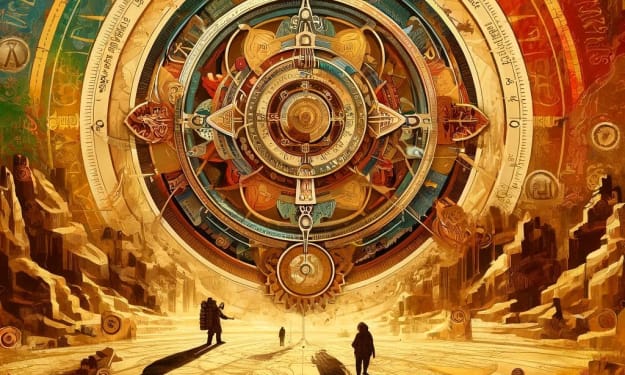Content warning
This story may contain sensitive material or discuss topics that some readers may find distressing. Reader discretion is advised. The views and opinions expressed in this story are those of the author and do not necessarily reflect the official policy or position of Vocal.
Unveiling the Enigma of Falling Angels: From Myth to Metaphor
unveiling the mystery of old
In the realm of folklore and theology, the concept of "falling angels" has captivated the imagination of humanity for centuries. These celestial beings, once revered as embodiments of purity and divinity, are depicted as undergoing a profound transformation, descending from heavenly grace into a state of rebellion or damnation. The allure of this enigmatic narrative has inspired countless works of art, literature, and religious discourse, each offering its interpretation of the origin and significance of these fallen entities.
The archetype of falling angels finds its roots in various cultural and religious traditions, with perhaps the most renowned depiction originating from Christian theology. According to Christian doctrine, angels are celestial beings created by God to serve as messengers, guardians, and agents of divine will. Chief among them was Lucifer, the Morning Star, renowned for his beauty, wisdom, and elevated status in the heavenly hierarchy.
However, pride and ambition led Lucifer to rebel against God, believing himself worthy of equal stature. This act of defiance precipitated his fall from grace, transforming him into Satan, the embodiment of evil and adversary of God. Alongside Lucifer, a legion of angels joined his rebellion, sharing in his fate and becoming the fallen angels who populate the depths of Christian cosmology.
The story of the falling angels serves as a cautionary tale, warning against the perils of hubris and the consequences of defying divine authority. It explores themes of temptation, redemption, and the nature of free will, prompting reflection on the complexities of moral agency and the eternal struggle between good and evil.
Beyond its religious significance, the motif of falling angels has permeated various facets of human culture, manifesting in literature, art, and popular imagination. In John Milton's epic poem "Paradise Lost," the fall of Lucifer and his cohorts serves as the central narrative, offering a complex exploration of sin, redemption, and the human condition. Milton's portrayal of Satan as a tragic figure, struggling with his pride and yearning for redemption, has cemented the character's status as a timeless symbol of rebellion and defiance.
Similarly, in art and iconography, the image of the fallen angel has been a recurring motif, often depicted as a figure cast out from the heavens, their once-glorious wings now tattered and broken. This imagery evokes a sense of melancholy and pathos, inviting viewers to contemplate the consequences of moral transgression and the fragility of divine grace.
In contemporary culture, the concept of falling angels continues to resonate, albeit in diverse and evolving forms. From Neil Gaiman's novel "Good Omens" to the television series "Supernatural," modern interpretations of angelic mythology explore themes of redemption, identity, and the blurred boundaries between good and evil. These narratives challenge traditional notions of morality, inviting audiences to reconsider the complexities of virtue and vice in an increasingly nuanced world.
Moreover, beyond its religious and cultural connotations, the metaphor of falling angels holds relevance in the realm of psychology and existential philosophy. Psychologist Carl Jung explored the archetype of the fallen angel as a symbol of the shadow self, representing repressed desires, instincts, and aspects of the psyche that are cast into darkness. According to Jung, acknowledging and integrating these shadow aspects is essential for psychological wholeness and self-awareness.
In existential philosophy, the notion of the fallen angel reflects the human experience of existential angst and alienation, stemming from our confrontation with the absurdity and meaninglessness of existence. Philosopher Jean-Paul Sartre famously declared that "hell is other people," suggesting that our sense of alienation and despair arises from the awareness of our fundamental separation from others and the inability to find authentic connection and meaning in a seemingly indifferent universe.
Ultimately, the allure of falling angels lies in its multifaceted symbolism and its capacity to provoke introspection, contemplation, and interpretation. Whether viewed through a religious, literary, psychological, or philosophical lens, the narrative of celestial beings cast out from heaven speaks to fundamental aspects of the human condition—our capacity for both greatness and folly, our yearning for transcendence and redemption, and our eternal quest for meaning and purpose in a vast and mysterious cosmos.
In unraveling the enigma of falling angels, we are confronted with profound questions about the nature of morality, the complexities of human psychology, and the eternal struggle between light and darkness within the human soul. It is a narrative that continues to inspire awe, fascination, and reflection, inviting us to delve deeper into the mysteries of existence and the enduring power of myth and metaphor.
About the Creator
Alohan I Rowland
I am a very innovative and aspiring kind of human i love music and i do music i love life and i love the earth so much
I love reading and i love to know much
Enjoyed the story? Support the Creator.
Subscribe for free to receive all their stories in your feed. You could also pledge your support or give them a one-off tip, letting them know you appreciate their work.







Comments
There are no comments for this story
Be the first to respond and start the conversation.